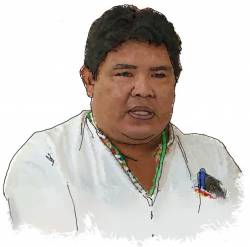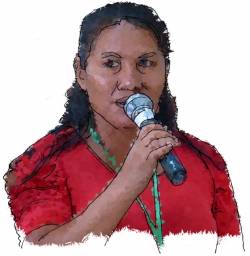Dialogue 13: Self-determination & coping with COVID19 in indigenous Lomerio, Bolivia
Este contenido esta disponible en Español | This content is also available in Spanish.
This is session is part of the Webinar "Dialogue on Alternatives in the Time of Global Crises".
Dialogue 13: Self-determination & coping with COVID19 in indigenous Lomerio, Bolivia
with Elmar Masay and Maria Chore, Monkoxi leaders, Bolivia
Monkoxi leaders from the Indigenous territory of Lomerio, Bolivia, will share experiences dealing with COVID-19. Though the pandemic led to 20 people dying, the Monkoxi were able to control further spread by blocking access in and out of their territories, coordinating with partners the delivery of biomedical equipment, and (esp. important) reviving traditional medicine and community care values and relations. Participatory indigenous research in collaboration with Nur University (Bolivia) and University of East Anglia (UK) is helping systematize this learning, for possible similar out-breaks in future, and to share with other indigenous nations. This builds on several years of process to claim self-determination rights to the territory.
- Date: Friday 23th October
- Time: 13:30 (UTC/GMT)
- Duration: 120 minutes
Recording
Download: [ Video ] (568Mb)
About the the presenters
Elmar Masay Soquere

Elmar Masay Soquere is Chief of the Monkoxi Indigenous Nation of Lomerio, Bolivia, located in the Chiquitano Dry Forest, the last best conserved dry tropical forest in the world. The Monkoxi were the first indigenous nation in Bolivia to self-proclaim themselves autonomous and the first case of forest certification in the country through the Forest Stewardship Council. They are about to become one of the first lowland Indigenous peoples to be recognized as autonomous under the country’s recent autonomy law and 2009 Constitution. From 2000 to 2001 Masay worked as a computer specialist for the Indigenous Center for the Original Peoples of Lomerio (CICOL). Between 2002 and 2009 he served as a technical advisor on the Indigenous Territorial Management Committee in the Native Communal Territory of Monteverde, focusing on sustainable development and natural resource management with the goal of gaining legal autonomy with a territorial base for 128 communities. He also participated in the Indigenous marches for sovereignty and Indigenous rights as well as to advocate for a Constituent Assembly to draft the 2009 Constitution. From 2010 to 2012 Masay provided technical support for the Lomerio Native Communal Territory in the process and legal claim for Indigenous Autonomy on behalf of the 29 communities located in the territory. Between 2013 and 2017 he was elected as chief of economy and production in CICOL. Subsequently, the communities decided to elect him as General Chief of CICOL, which is the maximum authority within the Monkoxi Nation in Lomerio territory.
Maria Chore

Maria Chore is a woman indigenous leader from Lomerio. As Chief of Autonomy in CICOL, she has played a central role mobilizing and foreseeing the claim for political autonomy before the Bolivian State. She has also been chief of Gender issues in CICOL and has worked as indigenous researcher in various projects related to the reconstruction of the Monkox indigenous identity.
More information
Recommended reading materials and sources: